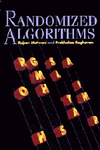Randomized Algorithms (Spring 2010)
This is the page for the class Randomized Algorithms for the Spring 2010 semester. Students who take this class should check this page periodically for content updates and new announcements.
There is also a backup page for off-campus users. The URL is http://lamda.nju.edu.cn/yinyt/random2010/
Announcement
- (03/15/2010) 通知:从明天(3月16日)开始,教室改为馆III-101,时间不变。
- (03/15/2010) 第三课的slides已上传。
- (03/08/2010) 第二课的slides已上传。
- (03/02/2010) 第一课的slides已上传,见lecture notes部分。pdf文件很大,请先下载再看,尽量不要直接在浏览器打开,可能会引起浏览器长时间失去响应
- (01/21/2010) 上课时间已改为 每周二的第三、四节。请选课的同学们注意。
Syllabus
随机化(randomization)是现代计算机科学最重要的方法之一,近二十年来被广泛的应用于计算机科学的各个领域。在这些应用的背后,是一些共通的随机化原理。在随机算法这门课程中,我们将用数学的语言描述这些原理,将会介绍以下内容:
- 一些重要的随机算法的设计思想和理论分析;
- 概率论工具及其在算法分析中的应用,包括常用的概率不等式,以及数学证明的概率方法 (the probabilistic method);
- 随机算法的概率模型,包括典型的随机算法模型,以及概率复杂度模型。
作为一门理论课程,这门课的内容偏重数学上的分析和证明。这么做的目的不单纯是为了追求严格性,而是因为用更聪明的方法去解决问题往往需要具备有一定深度的数学思维和数学洞察力。
先修课程 Prerequisites
- 必须:离散数学,概率论。
- 推荐:算法设计与分析。
Course materials
Policies
Assignments
There is no assignment yet.
Lecture Notes
- Introduction | slides
- Complexity classes, lower bounds | slides
- Balls and bins | slides
- Tail inequalities
- More on Chernoff bounds
- Hashing, limited independence
- Martingales
- The probabilistic method
- Randomized rounding
- Random graphs, graph algorithms
- Markov chains and random walks
- Random sampling
- Approximate counting
- Geometric algorithms
- Fingerprinting
- Number theory algorithms
- Distributed Algorithms
- Data streams
The Probability Theory Toolkit
- Linearity of expectation (used in Lecture Notes 1, 3)
- Independent events and conditional independence (used in Lecture Notes 1, 3)
- Conditional probability and conditional expectation (used in Lecture Notes 1, 2, 3)
- The law of total probability and the law of total expectation (used in Lecture Notes 2)
- The union bound (used in Lecture Notes 3)
- Bernoulli trials (used in Lecture Notes 3)
- Geometric distribution (used in Lecture Notes 3)
- Markov's inequality (used in Lecture Notes 3)
- Chebyshev's inequality (used in Lecture Notes 3, 4)
- Binomial distribution (used in Lecture Notes 4)
- Chernoff bound (used in Lecture Notes 4)
Acknowledgment
Thanks the LAMDA group for hosting the webpage for off-campus users. Special thanks to YU Yang for his time and technical supports.
